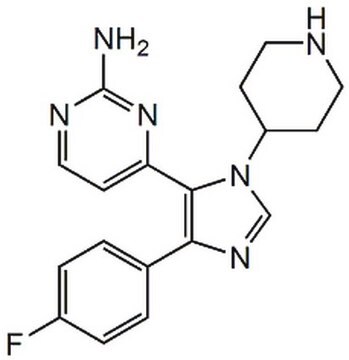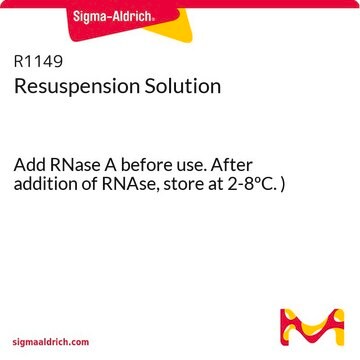S9070
SB 220025 trihydrochloride
≥98% (HPLC), solid
Sinónimos:
5-(2-Aminopyrimidin-4-yl)-4-(4-fluorophenyl)-1-(4-piperidinyl)imidazole trihydrochloride
About This Item
Productos recomendados
Quality Level
assay
≥98% (HPLC)
form
solid
color
white
solubility
H2O: 22 mg/mL
originator
GlaxoSmithKline
SMILES string
Cl[H].Cl[H].Cl[H].Nc1nccc(n1)-c2c(ncn2C3CCNCC3)-c4ccc(F)cc4
InChI
1S/C18H19FN6.3ClH/c19-13-3-1-12(2-4-13)16-17(15-7-10-22-18(20)24-15)25(11-23-16)14-5-8-21-9-6-14;;;/h1-4,7,10-11,14,21H,5-6,8-9H2,(H2,20,22,24);3*1H
InChI key
IPFBHUGKKONHFR-UHFFFAOYSA-N
Application
Biochem/physiol Actions
Features and Benefits
Storage Class
11 - Combustible Solids
wgk_germany
WGK 3
flash_point_f
Not applicable
flash_point_c
Not applicable
ppe
Eyeshields, Faceshields, Gloves, type P2 (EN 143) respirator cartridges
Certificados de análisis (COA)
Busque Certificados de análisis (COA) introduciendo el número de lote del producto. Los números de lote se encuentran en la etiqueta del producto después de las palabras «Lot» o «Batch»
¿Ya tiene este producto?
Encuentre la documentación para los productos que ha comprado recientemente en la Biblioteca de documentos.
Artículos
The mitogen-activated protein kinase (MAPK) family consists of stress-activated (SAPK) and MAPKs. Learn about their network of signal transduction cascades that mediate cellular responses to a diverse range of stimuli.
The mitogen-activated protein kinase (MAPK) family consists of stress-activated (SAPK) and MAPKs. Learn about their network of signal transduction cascades that mediate cellular responses to a diverse range of stimuli.
The mitogen-activated protein kinase (MAPK) family consists of stress-activated (SAPK) and MAPKs. Learn about their network of signal transduction cascades that mediate cellular responses to a diverse range of stimuli.
The mitogen-activated protein kinase (MAPK) family consists of stress-activated (SAPK) and MAPKs. Learn about their network of signal transduction cascades that mediate cellular responses to a diverse range of stimuli.
Nuestro equipo de científicos tiene experiencia en todas las áreas de investigación: Ciencias de la vida, Ciencia de los materiales, Síntesis química, Cromatografía, Analítica y muchas otras.
Póngase en contacto con el Servicio técnico








